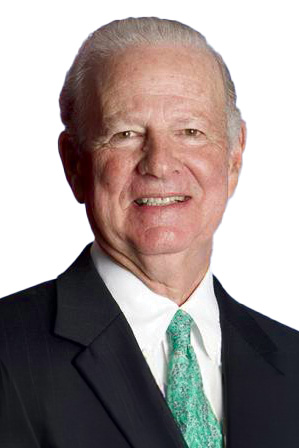The Best, Brightest, and Most Loyal
BY JAMES A. BAKER, III

Not long after the conclusion of World War I, a bespectacled, balding, and mustachioed congressman from Massachusetts named John Jacob Rogers identified a flaw in U.S. diplomacy. Too many American diplomats, he argued, were merely wealthy friends of presidents without the skills required to serve their country abroad.
The congressman began a campaign resulting in the Rogers Act of 1924 that merged the diplomatic and consular services of the U.S. government into the U.S. Foreign Service.
Diplomats had to pass an extremely difficult Foreign Service examination intended to identify the most qualified applicants. The act also established a merit-based career path and better pay to encourage less affluent individuals to serve.
“Let us strive for a foreign service which will be flexible and democratic; which will attract and retain the best men we have; which will offer reasonable pay, reasonable prospects for promotion, [and] reasonable provision against want when old age comes to a faithful servant,” Rogers said in 1923.
A century later, Rogers’ vision of a professional Foreign Service has become a reality, one that plays a vital role in keeping our nation safe, secure, and strong. The people who make up our Foreign Service represent the best, brightest, and most loyal our country has to offer. And increasingly, members of the Foreign Service are no longer simply “male, pale, and Yale” as described in years past. U.S. diplomats represent our country in all its variety.
The State Department defines the role of a U.S. diplomat simply, in 17 words: “to promote peace, support prosperity, and protect American citizens while advancing the interests of the U.S. abroad.” The traits required to properly perform that role are varied and complex. Our Foreign Service officers are the “Swiss Army knives” of public servants—possessing numerous distinct capabilities to address any situation. They must be well versed in a range of foreign and domestic subjects.
The path to becoming a Foreign Service officer is quite strenuous. Thousands compete annually for just a few hundred open spots, and the hiring process can take more than a year.
To properly perform their jobs, Foreign Service officers and specialists must be:
Intelligent and Knowledgeable. The areas of expertise for Foreign Service professionals can encompass a variety of disciplines. Many come from the top universities in the nation. All are highly qualified.
Patriotic. Just like their brethren in the armed services, Foreign Service inductees take an oath of office to protect and defend the Constitution. This loyalty to country is the moral bedrock of the U.S. Foreign Service.
Team Players. Because diplomats represent the United States abroad, they must speak with one unified voice. Differences should be kept within the government. If a diplomat disagrees profoundly with a policy, they should resign and only then go public with their criticism, not undermine policy from within.
Self-Starters. Initiative is a key component of being an effective diplomat. Simply sitting around waiting for orders from Washington is a recipe for failure. American diplomats should be constantly on the lookout for ways to advance our nation’s interests and values.
Adventurous and Brave. Foreign Service officers and specialists expect to spend much of their careers abroad. Some assignments will be in challenging places; some will be downright dangerous. Successful Foreign Service members revel in the diversity of foreign societies and accept physical risk as a simple matter of their profession.
Ethical. Integrity is a key component of the Foreign Service. For many people around the world, the face of American diplomats is the face of our country. And it must be a face of honesty, fairness, and candor.
My proudest and most productive times in government were when I was at Foggy Bottom.
I was honored to collaborate with the members of the Foreign Service, the elite corps that serves our country around the world. They are talented and loyal public servants, and any Secretary of State would be foolish not to harness their strengths.
When sharing or linking to FSJ articles online, which we welcome and encourage, please be sure to cite the magazine (The Foreign Service Journal) and the month and year of publication. Please check the permissions page for further details.
Read More...
- “Remembering a Power Broker” by Joseph L. Novak, The Foreign Service Journal, June 2021
- “Diplomats Make a Difference: The U.S. and Mongolia, 1986-1990” by Joseph E. Lake and Michael Allen Lake, The Foreign Service Journal, September 2021

